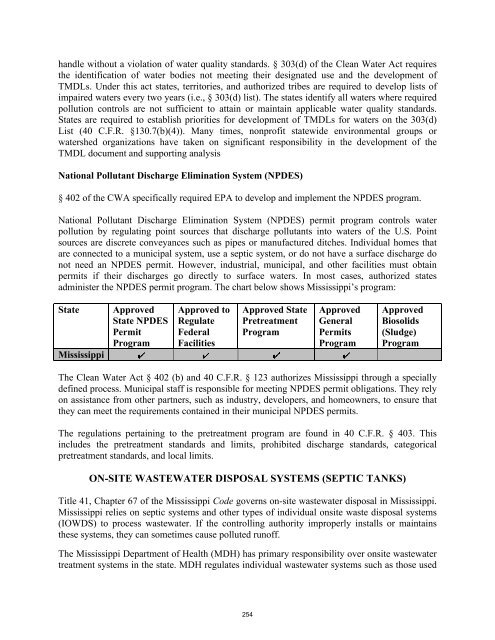in Mississippi
m2078-county-gov-ms
m2078-county-gov-ms
You also want an ePaper? Increase the reach of your titles
YUMPU automatically turns print PDFs into web optimized ePapers that Google loves.
handle without a violation of water quality standards. § 303(d) of the Clean Water Act requires<br />
the identification of water bodies not meet<strong>in</strong>g their designated use and the development of<br />
TMDLs. Under this act states, territories, and authorized tribes are required to develop lists of<br />
impaired waters every two years (i.e., § 303(d) list). The states identify all waters where required<br />
pollution controls are not sufficient to atta<strong>in</strong> or ma<strong>in</strong>ta<strong>in</strong> applicable water quality standards.<br />
States are required to establish priorities for development of TMDLs for waters on the 303(d)<br />
List (40 C.F.R. §130.7(b)(4)). Many times, nonprofit statewide environmental groups or<br />
watershed organizations have taken on significant responsibility <strong>in</strong> the development of the<br />
TMDL document and support<strong>in</strong>g analysis<br />
National Pollutant Discharge Elim<strong>in</strong>ation System (NPDES)<br />
§ 402 of the CWA specifically required EPA to develop and implement the NPDES program.<br />
National Pollutant Discharge Elim<strong>in</strong>ation System (NPDES) permit program controls water<br />
pollution by regulat<strong>in</strong>g po<strong>in</strong>t sources that discharge pollutants <strong>in</strong>to waters of the U.S. Po<strong>in</strong>t<br />
sources are discrete conveyances such as pipes or manufactured ditches. Individual homes that<br />
are connected to a municipal system, use a septic system, or do not have a surface discharge do<br />
not need an NPDES permit. However, <strong>in</strong>dustrial, municipal, and other facilities must obta<strong>in</strong><br />
permits if their discharges go directly to surface waters. In most cases, authorized states<br />
adm<strong>in</strong>ister the NPDES permit program. The chart below shows <strong>Mississippi</strong>’s program:<br />
State<br />
<strong>Mississippi</strong><br />
Approved<br />
State NPDES<br />
Permit<br />
Program<br />
Approved to<br />
Regulate<br />
Federal<br />
Facilities<br />
Approved State<br />
Pretreatment<br />
Program<br />
Approved<br />
General<br />
Permits<br />
Program<br />
Approved<br />
Biosolids<br />
(Sludge)<br />
Program<br />
The Clean Water Act § 402 (b) and 40 C.F.R. § 123 authorizes <strong>Mississippi</strong> through a specially<br />
def<strong>in</strong>ed process. Municipal staff is responsible for meet<strong>in</strong>g NPDES permit obligations. They rely<br />
on assistance from other partners, such as <strong>in</strong>dustry, developers, and homeowners, to ensure that<br />
they can meet the requirements conta<strong>in</strong>ed <strong>in</strong> their municipal NPDES permits.<br />
The regulations perta<strong>in</strong><strong>in</strong>g to the pretreatment program are found <strong>in</strong> 40 C.F.R. § 403. This<br />
<strong>in</strong>cludes the pretreatment standards and limits, prohibited discharge standards, categorical<br />
pretreatment standards, and local limits.<br />
ON-SITE WASTEWATER DISPOSAL SYSTEMS (SEPTIC TANKS)<br />
Title 41, Chapter 67 of the <strong>Mississippi</strong> Code governs on-site wastewater disposal <strong>in</strong> <strong>Mississippi</strong>.<br />
<strong>Mississippi</strong> relies on septic systems and other types of <strong>in</strong>dividual onsite waste disposal systems<br />
(IOWDS) to process wastewater. If the controll<strong>in</strong>g authority improperly <strong>in</strong>stalls or ma<strong>in</strong>ta<strong>in</strong>s<br />
these systems, they can sometimes cause polluted runoff.<br />
The <strong>Mississippi</strong> Department of Health (MDH) has primary responsibility over onsite wastewater<br />
treatment systems <strong>in</strong> the state. MDH regulates <strong>in</strong>dividual wastewater systems such as those used<br />
254


